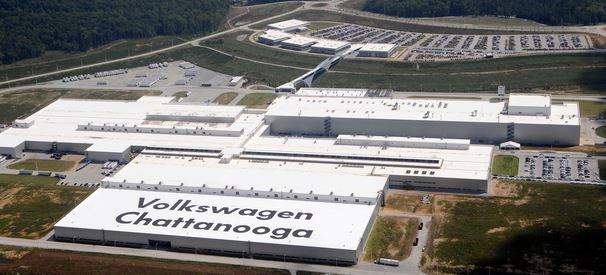In a car plant in Chattanooga, Tennessee, Volkswagen workers declined union representation in a surprise move.
The vote was a serious setback for the United Auto Workers (UAW) that planned to represent foreign-owned automobile vehicle plants in the south of the country.
The union had the cooperation and support of Volkswagen management, and even help from Germany’s mighty IG Metall union. Failing to win the vote is a bitter defeat for the UAW.
About 1,550 car plant workers (89% turnout) rejected the union plan by 712 to 626.
The ballot, which had faced resistance from Republican lawmakers, but was supported by the company, had been expected to favor Volkswagen union representation.
The UAW had not tried to unionize a foreign-owned car plant for 13 years. The union’s reputation has been seriously hurt by the result of the ballot, industry experts say. Local media today say that from now on the union is going to find it more difficult to recruit members in other southern factories.
In the South, anti-union sentiment is relative strong compared to other parts of the US. The UAW had tried several times to unionize car plants in this part of the country, with no success.
The UAW, which has 400,000 members today, has seen its numbers fall by 75% over the last 35 years.
The ballot had outside interference, says union
According to Gary Casteel, a spokesman for the union and organizer of the VW campaign, the poll had been tarnished by some outside interference.
After the vote, Casteel said:
“There are still some issues that have to be sorted out about this election, and we’ll let the people that do that evaluate the impact of others and whatnot further down the road.”
Thirteen billboards, allegedly purchased by the Center for Worker Freedom, had been placed around the town. (Note the spelling of “politicians”)
The BBC quoted Art Schwartz, a former General Motors union negotiator, who wondered “If they can’t win this one, what can they win?”
In an interview with The Wall Street Journal, labor lawyer Cliff Hammond said “This vote was essentially gift-wrapped for the union by Volkswagen.”
Volkswagen unionization common globally
Volkswagen has 61 other plants worldwide, all with unions (work councils) that represent the workers and liaise with the management on a daily basis. When the company opened its Chattanooga plant in 2010, eventual Volkswagen unionization had been a foregone conclusion.
Work councils are compulsory in Germany and widely used throughout Europe, but they have never been tried in a US plant.
The 1,400-acre Volkswagen Chattanooga plant has 3,200 VW workers and 9,500 indirect supplier employees.
Franch Fischer, Volkswagen’s Chattanooga CEO, had previously said that he expected the plant to create a “uniquely American Works Council.”
The UAW must now abandon all organizing efforts targeting the Chattanooga plant for at least 12 months, under an agreement it signed with Volkswagen.
Over the last 30 years, new legislation has tended to go against the growth and influence of workers unions. In Wisconsin, for example, laws have been enacted that reduce the power of public-worker unions. In the UAW’s hometown, Michigan, right-to-work laws have been passed which give employees the choice of belonging (or not) to a union.
According to the Bureau of National Statistics, part of the US Department of Labor, the union membership rate nationally across the United States was 11.3% in 2013, compared to 20.1% in 1983.



